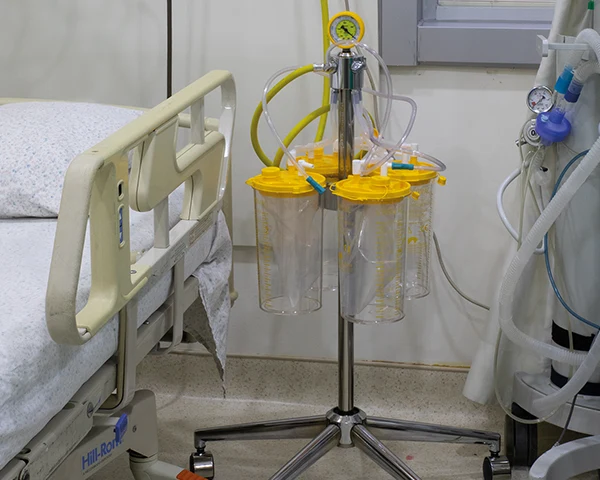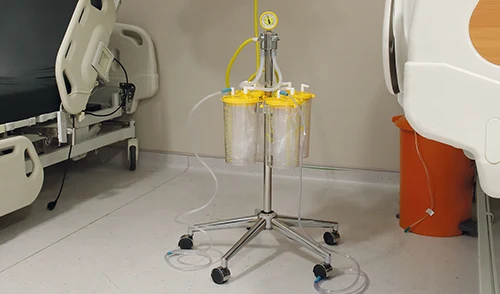Intensive Care Units

What is the importance of STERVAC Suction Systems in intensive care units of hospitals? Why are suction systems used?
An Intensive Care Unit (ICU) is a part of a hospital specially designed for critically ill patients. In this unit, patients are carefully monitored and treated by a team of specialists around the clock.
Patients being treated in the ICU may often be experiencing one or more of the following conditions:
- Respiratory failure: Inability of the patient to get enough oxygen on their own
- Circulatory failure: Inability of the heart to pump enough blood around the body
- Organ failure: The inability of one or more organs, such as the kidneys, liver or brain, to function
- Severe trauma: Tissue damage caused by an accident or injury
- Severe infection: The body's severe reaction to infection, such as sepsis or pneumonia
- Postoperative complications: Conditions that occur after surgery and pose a threat to the patient's life.
Some of the treatments offered to patients in the ICU are as follows:
- Ventilation: Use of a ventilator to support the patient's respiratory function
- Circulatory support: Intravenous fluids and medication, use of heart-lung machine
- Organ replacement therapy: Restoring organ function, such as dialysis or respiratory support
- Wound care: Care and treatment of surgical and other wounds
- Pain management: Medication and other methods to control the patient's pain
- Nutritional support: Meeting the patient's nutritional and fluid needs intravenously or with special nutrition products
The ICU team works together to provide patients with the best possible care. The team includes medical staff from different specialties, such as doctors, nurses, physiotherapists, respiratory therapists, dieticians and psychologists.
The length of ICU stay depends on the patient's condition and response to treatment. Some patients may be discharged to the normal ward after a few hours or days, while others may stay in the ICU for longer.
Staying in the ICU can be a challenging experience for both the patient and the family. Patients are often intensively monitored and treated, and family members may face restrictions on visiting them.
However, staying in the ICU can be vital for critically ill patients. The specialized team in the ICU can significantly improve patients' chances of survival.
The Importance of STERVAC Aspiration Systems in Intensive Care Units of Hospitals
Aspiration systems in intensive care units (ICU) are critically important medical devices used to clear secretions and fluids from patients' airways. These systems are vital to maintain patients' breathing and oxygen intake.
The importance of using suction systems in ICUs:
1. Respiratory tract cleansing:
- Intensive care unit patients may experience accumulation of mucus, blood or other fluids in their airways for various reasons. This can block the airways, making breathing difficult and leading to infections such as pneumonia.
- Suction systems help keep the airways open by gently and safely removing these secretions and fluids.
- Respiratory tract cleansing helps to improve patients' oxygen uptake and respiratory function.
2. Pneumonia Prevention:
- Secretions and fluids that accumulate in the respiratory tract can lead to serious infections such as pneumonia.
- Suction systems help reduce the risk of pneumonia by keeping the airways clear.
3. Patient Comfort:
- Secretions and fluids in the respiratory tract can cause cough, shortness of breath and chest pain in patients.
- Suction systems help improve patient comfort by alleviating these symptoms.
4. Reducing the Risk of Complications:
- Suction systems can help shorten ventilator stays and reduce the risk of invasive procedures such as intubation by keeping the airways clear.
Aspiration systems are vital devices used in intensive care units to protect patients' respiratory functions and prevent complications such as pneumonia.
Aspiration systems are used in the following situations:
-If the patient has a weak or absent cough reflex
-If the patient has mucus or blood accumulation in the airways
-Patient is connected to a ventilator
-The patient has a tracheostomy or endotracheal tube inserted
Suction systems are available in different types and specifications. The most suitable suction system is selected according to the patient's specific needs and condition.
Specialized training is provided to nurses and other healthcare personnel on the use of suction systems. This training includes information on how to use the suction system correctly and how to prevent possible complications.
Suction systems play an important role in the vital treatment of patients in Intensive Care Units. When used correctly, suction systems help to maintain patients' respiratory function, prevent complications such as pneumonia and improve their quality of life.


